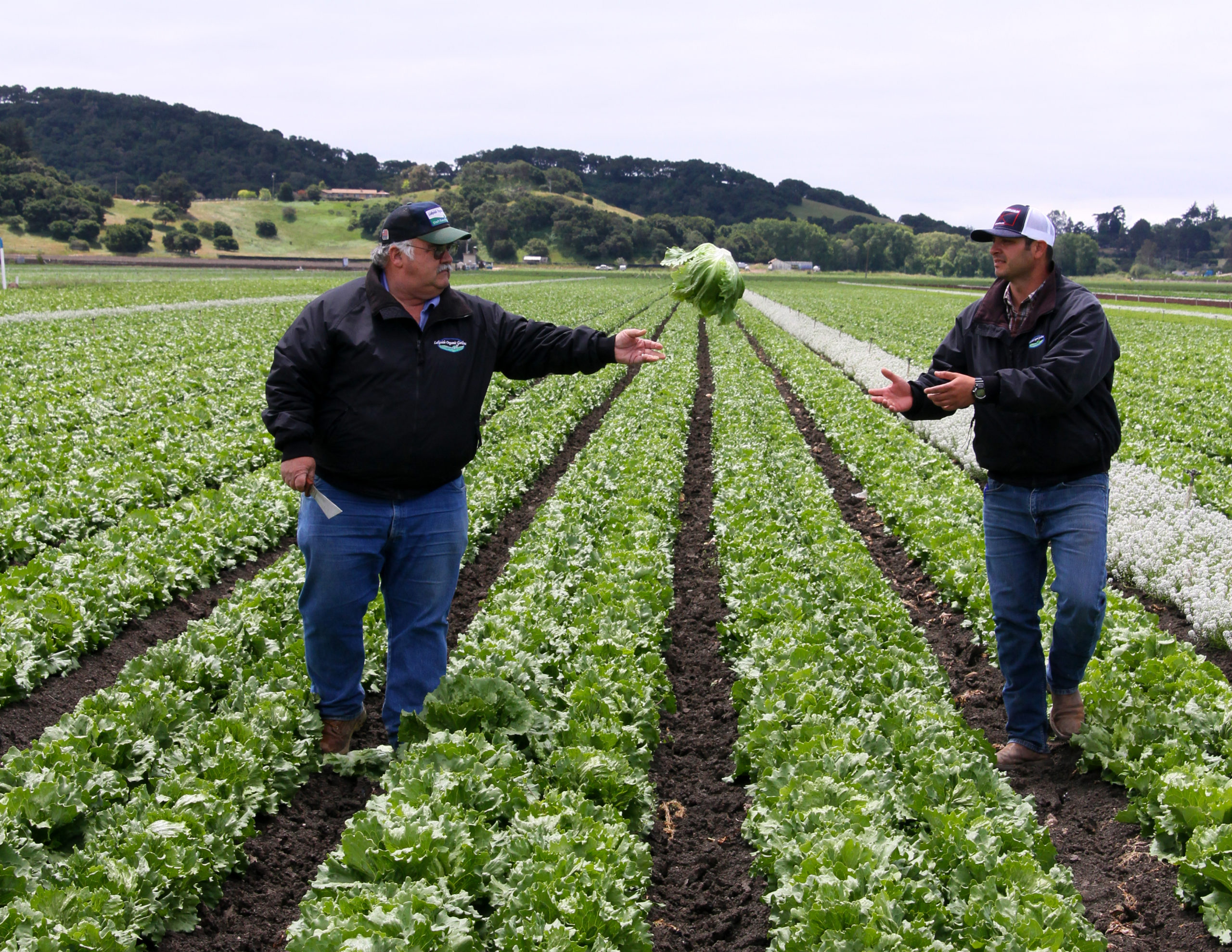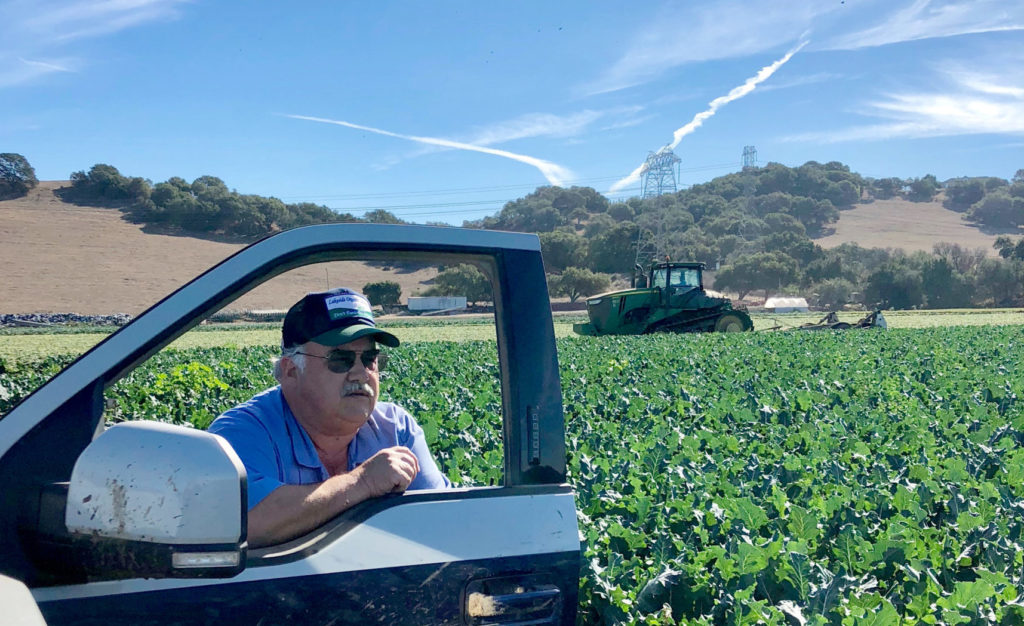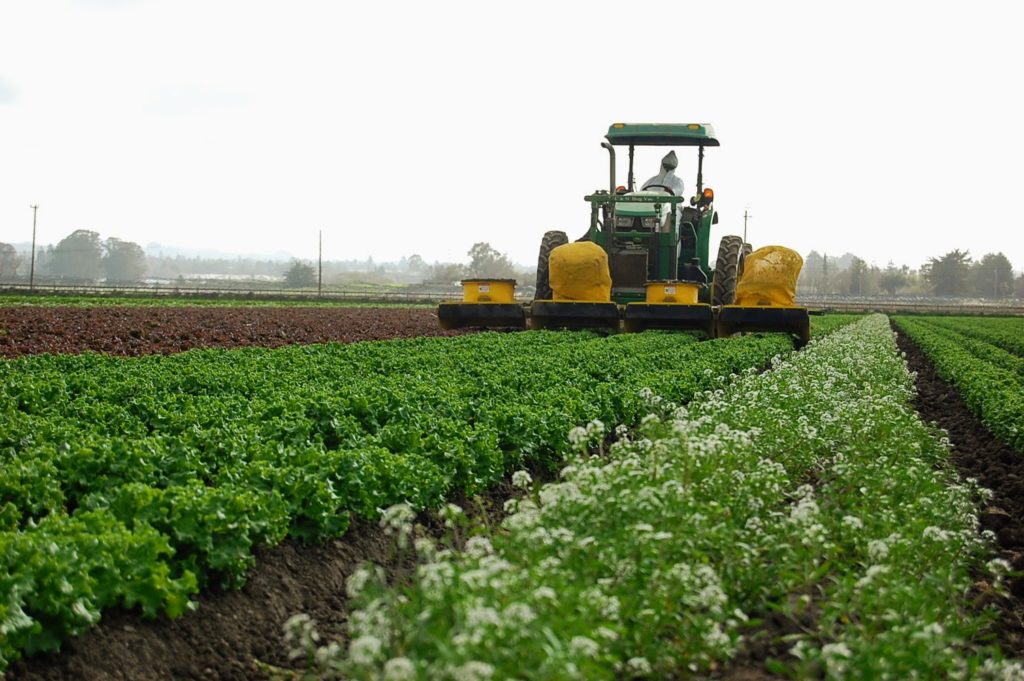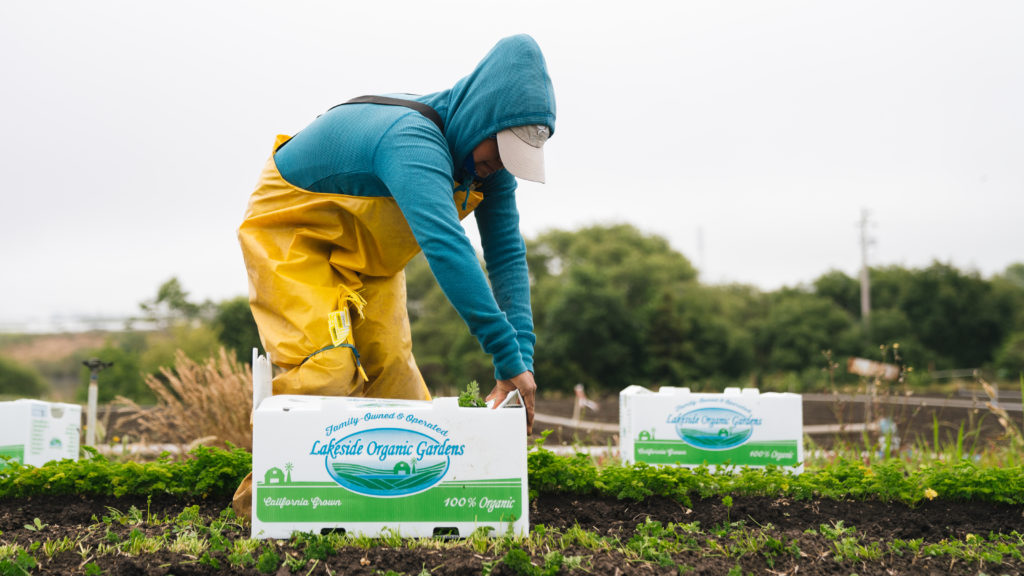
May 1, 2020
Organic grower committed to his central California coast home
The Pacific Coast range rolls down to the Santa Maria Ranch, where Pajaro Valley farmer Dick Peixoto’s Lakeside Organic Gardens is readying to harvest lettuce in late March.
The foothills bring down what Peixoto, 63, calls “beneficials” – insects that help his completely organic growing process. These include ladybugs and hoverflies, native to the nearby Santa Cruz Mountains, among other critters attracted to eating invasive prey like aphids and nectar from rows of flowers within Lakeside fields and surrounding the ranch on winding country roads.

“I’d like to claim credit for everything, but Mother Nature had all this figured out way before we even came around,” Peixoto, a third-generation farmer along California’s Central Coast, said. He pointed to the hoverfly, also known as syrphid fly, as testament. “They were around all the time. And what we did is we came in with conventional sprays and killed them all off just the same as they were good or bad … it was like kill everything, you know? And then we found out, you know, ‘Hey, Mother Nature put them here for a reason.’”
The son of a pesticide salesman and grandson of a potato farmer originally from the Azores Islands, Peixoto started in agriculture early – on his family’s 15-acre farm in the Pajaro Valley, which was self-sustaining with chickens, eggs and a garden. In eighth grade, he began growing cherry tomatoes on an acre, harvesting before and after school. By the end of high school, Peixoto was renting 40 acres on three parcels to produce green beans, zucchini and cucumbers for Del Monte Foods.
Peixoto worked two decades in conventional growing before he founded Lakeside with his brother, Bill, in 1996. Peixoto said the conventional business model benefitted shippers to pack, sell and retain what was left, leaving smaller growers like his family out to dry.
With Lakeside, the Peixotos began with a 50-acre plot growing more than 30 different commodities that, with transition to methods like compost in place of synthetic fertilizer, would become fully organic by 2000. At first they struggled being too big with all the land, and too small with all the work needed to be done. Peixoto remembers doing everything himself – laying pipes, driving the tractor. “I was the whole operation back then,” he said.
It was early then for the organic market, too. When he told other local growers about his plans going organic, they called him crazy, he now says with a chuckle.
Nearly a quarter-century later, with 350 dedicated employees, 3,000 acres of vegetables and an expansive philanthropic initiative dedicated to their home base in Watsonville, California, Lakeside’s operations have expanded to boast itself as the nation’s largest family-owned and operated solely organic vegetable grower-shipper.
Tied to the coastal land

At the Santa Maria Ranch located just outside of Watsonville, a C&N Bug Vac hummed up and down the rows on an overcast March afternoon. A John Deere 5100MH tractor rigged with bags and hydraulically powered vacuums, the invention helps remove pests like diabrotica beetles that live underneath the lettuce plants and eat away at the leaves. According to Peixoto, the beneficials are too small for the vacuums.
Peixoto also works with surrounding berry growers to rotate crops, even sharing sprinkler pipes, tractors and workers.
“We kind of complement each other, so rather than you stay on your side of the fence and I’ll stay on my side of the fence, we work a lot better together,” Peixoto said.
Lakeside’s Santa Maria Ranch lettuce plot, on Driscoll’s land, grew blueberries two years ago. The partnership works both ways, as breaks from intensive production on the same plot help the soil recuperate — ridding of diseases like corky root for lettuce and club root in cauliflower that aren’t harmful to fruits, and vice versa. Broccoli, for example, is a great fumigant for strawberries, Peixoto added.
And Lakeside has helped introduce other innovations such as using composting instead of conventional fertilizers because it improves the “living soil” to increase future harvests, according to Peixoto. This has already reduced millions of tons of pesticides and synthetic fertilizers to local soil and produce.
“They really like that,” added Marliese McWherter, creative marketing manager for Lakeside. “Their yields are quite good after going in right after us.”
As a lifelong Pajaro Valley resident, Peixoto knows the land, from the foothills to the beach. His daily routine, waking up at 4:45 a.m. six days a week with a half-day on Sunday, includes seeing the 2,000 acres of land along the Central Coast. Lakeside has another 1,000 acres in California’s Imperial Valley, a hub for the state’s winter agricultural production.
His right-hand man, Juan Gonzalez, monitors Pajaro Valley’s coastal areas while Peixoto looks inland. The two men rotate every other day, which often includes overseeing up to 50 varieties that Lakeside grows.
Peixoto’s day begins with meetings with Lakeside’s production, harvesting and sales staff, before going to the fields and often to the company’s new 55,000-square-foot cooler in Watsonville. Their previous cooler, just 17,000 square feet and half the height, was not meeting the company’s growing demands. The new facility, finished in 2017, is complete with solar panels and other environmentally friendly cost-saving measures, along with 100,000 square feet of covers and offices. Peixoto said Lakeside is also considering adding a sustainability director to oversee and analyze more environmentally friendly methods to operations.
Recently, Lakeside also introduced recyclable plastic boxes to replace industry-used single-use wax cartons for wet vegetables. Part of a plan years in the making, this allows Lakeside to continue recycling the same plastics, further reducing the company’s carbon footprint.
By next year, the company expects a complete transition to recycled boxes for wet vegetable storage, Peixoto said.
The move to recyclables, Peixoto added, is part of a larger mission he has adopted from the Boy Scouts motto of “Leave no trace.” Peixoto said, “You just want to leave everything better than when you found it.”
Community Driven

Despite innovations improving the sustainability and efficiency of getting produce to consumers, Lakeside is still dealing with the agricultural labor shortage impacting others in the industry. There aren’t enough workers in the field during peak harvest season, allowing some produce to go to waste, as he told Good Times Santa Cruz, a weekly newspaper, in 2018.
To combat shortages, Peixoto is looking at mechanization in the fields to ameliorate labor with irrigation, cultivation and fertilizing.
Still, Peixoto said the employees – from radish pickers to the guy hoeing weeds – make Lakeside run. The company provides end-of-year bonuses to all staff along with company perks like daily fresh produce. Lakeside, after all, has workers who have been with the company since before the organic transition, and still has family members working from pipe installation to marketing.
“As a businessman, it’s not all about profit,” Peixoto said. “It’s about creating wealth, and creating wealth goes to your employees, to your community, to everyone around you. I think there’s a lot to that.”
This reflects the company’s dedication to Watsonville. Lakeside is a regular sponsor at local festivals and soccer leagues, but it has also donated over 300,000 pounds of food – translating to more than four million meals – as Second Harvest Food Bank recognized Peixoto’s work, according to the Monterey Bay Economic Partnership. The company also contributes to local schools, organizations and scholarships, in addition to its own California Grill, the Peixoto’s family restaurant which uses locally grown produce, meats and desserts to help support the Katz Cancer Resource Center at Santa Cruz’s Dominican Hospital and Jacob’s Heart Children’s Cancer Support Services in Watsonville.
Peixoto’s workday ends around 7 p.m. At home, he plans the schedule for the next day. His wife once joked to him she was jealous of Jimmy Fallon, host of “The Tonight Show,” because he spends evenings watching the late-night show before going to bed and starting his day again.
But organic farming is what Peixoto loves to do. He enjoys telling Santa Cruz residents coming down each September to the county fair, situated a half-mile from the Santa Maria Ranch, about all the local organic bounty grown by Lakeside.
“I’ve always had a passion for farming and organic is just above and beyond cause I think you can honestly say it’s changing people’s lives,” he said. “If you’re farming organic and you play by the rules, I think you’re making the soil better, you’re making the ground better.
“You’re improving people’s lives with what they’re eating with all the cancer and everything we have going on. It’s gotta be better for people.”
Top photo: Lakeshore Organic Gardens owner Dick Peixoto tosses a head of iceberg lettuce to his operations manager and right-hand man Juan Gonzalez.






